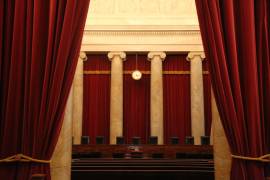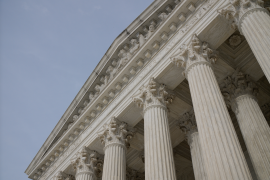
Antigay Political Attacks and Special Interest Spending Threaten our Courts
Blog Search
Political attacks on the courts stemming from rulings affecting the rights of LGBT people and their families are nothing new – but they are dangerous to our democracy.
Last month, an Ohio lawmaker called for the impeachment of a federal judge who ruled that the state must recognize the marriage of a terminally ill man and his husband, accusing the judge of "malfeasance and abuse of power." In August, a conservative state judge in Kentucky stated in an op-ed for the local paper that the Supreme Court rulings on DOMA and Prop 8 did not change Kentucky’s “simple and traditional” marriage law. Just this month, after the New Jersey Supreme Court denied the State's motion to postpone, which allowed same-sex couples to marry, Governor Christie took the Court to task for “substituting its judgment for the constitutional process of the elected branches or a vote of the people.”
Often this harmful and misguided rhetoric is backed up by significant financial resources.
A new report co-authored by Justice at Stake, the Brennan Center for Justice, and the National Institute on Money in State Politics, analyzes the prominent role of special interest money in state Supreme Court elections. The report highlights how many of these races seemed “alarmingly indistinguishable from ordinary political campaigns—featuring everything from Super PACs and mudslinging attack ads to millions of dollars of candidate fundraising and independent spending.”
According to the report, there was an estimated $54.6 million spent on judicial races overall during the 2011-12 election cycle with $33.7 million in TV spending alone. This raises real concerns about the ability of our courts to remain independent and provide equal access to justice.
For the LGBT community, courts resolve cases on fundamental issues that affect nearly every aspect of life— employment and housing protections, access to health care, parenting rights, the freedom to marry. It is vitally important that these cases are resolved by fair and impartial judges who make decisions based on the law and the facts in each case and not on the basis of politics, popular opinion, campaign contributions, or Super PAC spending.
In 2009, the Iowa Supreme Court issued a unanimous decision in Lambda Legal's lawsuit Varnum v. Brien, striking down Iowa's marriage ban and extending the freedom to marry to same-sex couples. In response, antigay groups, including the National Organization for Marriage and the American Family Association, took their anger out on the Court, spending nearly $1 million on attack ads and a bus tour during the 2010 judicial retention race where they succeeded in defeating three justices who participated in the Varnum decision.
In 2012, antigay groups were at it again, spending $466,000 in an attempt to oust a fourth justice, David Wiggins, for his vote in the ruling.
Take a look at the attack ad that ran in Iowa right before the retention election.
This attempt to bully the bench was intended to have broad implications for judges across the nation, and the message delivered by these single-issue groups was clear: Rule against us, and you will be next.
Fortunately, in 2012, Iowa voters rejected this assault on justice by standing up and protecting the courts. However, with 38 states holding some form of judicial election and the current increase in spending on these races, there is every reason to believe that special interests will persist in their attempt to influence the courts.
Our mission is clear. If we care about justice and the rule of law, we have to care about our courts. As former Supreme Court Justice Sandra Day O’Connor has said, “[in] these challenging and difficult times, we must recommit ourselves to maintaining the independent judiciary that our Framers sought to establish.”
To find out more about what you can do protect the courts, visit Lambda Legal’s Fair Courts Project at lambdalegal.org/issues/fair-courts-project.




